#if that is a pattern across all participating countries
Text
.
#just ignore#it's not about me at all#but i want to cry#e*rovision is usually my favourite week of the year#i'm not watching it this year - something that is proving extremely difficult for me because of my intense fixation normally#and I gave it up this year in the hope that there would be a united front against i*rael's participation#... that hope is gone now#not only have I learned that they qualified for the final tonight#and no major protest took place in the arena#but italy seems to have published their televote results#and they seemed to have given them almost 40% of the vote#if that is a pattern across all participating countries#that's likely an i*raeli win#which makes me feel sick to my stomach#why is evil being applauded and rewarded#it seems there was no hope either way#either watch and provide views/money to the ebu who support i*rael#or boycott - leaving only masses of i*rael supporters to vote and get them to do well
3 notes
·
View notes
Text
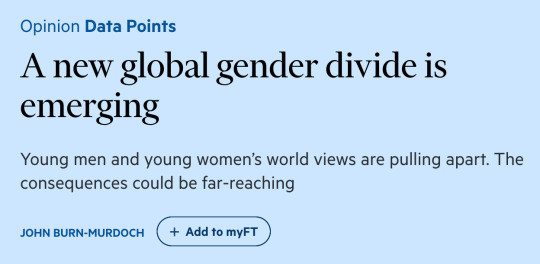
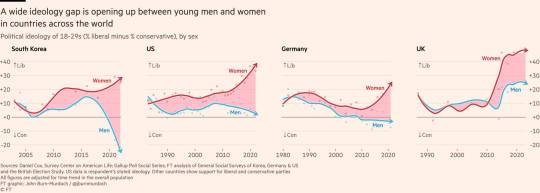
A new global gender divide is emerging (John Burn-Murdoch, Financial Times, Jan 26 2024)
"In the US, Gallup data shows that after decades where the sexes were each spread roughly equally across liberal and conservative world views, women aged 18 to 30 are now 30 percentage points more liberal than their male contemporaries.
That gap took just six years to open up.
Germany also now shows a 30-point gap between increasingly conservative young men and progressive female contemporaries, and in the UK the gap is 25 points.
In Poland last year, almost half of men aged 18-21 backed the hard-right Confederation party, compared to just a sixth of young women of the same age.
Outside the west, there are even more stark divisions.
In South Korea there is now a yawning chasm between young men and women, and it’s a similar situation in China.
In Africa, Tunisia shows the same pattern.
Notably, in every country this dramatic split is either exclusive to the younger generation or far more pronounced there than among men and women in their thirties and upwards.
The #MeToo movement was the key trigger, giving rise to fiercely feminist values among young women who felt empowered to speak out against long-running injustices.
That spark found especially dry tinder in South Korea, where gender inequality remains stark, and outright misogyny is common.
In the country’s 2022 presidential election, while older men and women voted in lockstep, young men swung heavily behind the right-wing People Power party, and young women backed the liberal Democratic party in almost equal and opposite numbers.
Korea’s is an extreme situation, but it serves as a warning to other countries of what can happen when young men and women part ways.
Its society is riven in two. Its marriage rate has plummeted, and birth rate has fallen precipitously, dropping to 0.78 births per woman in 2022, the lowest of any country in the world. (…)
It would be easy to say this is all a phase that will pass, but the ideology gaps are only growing, and data shows that people’s formative political experiences are hard to shake off.
All of this is exacerbated by the fact that the proliferation of smartphones and social media mean that young men and women now increasingly inhabit separate spaces and experience separate cultures.
Too often young people’s views are overlooked owing to their low rates of political participation, but this shift could leave ripples for generations to come, impacting far more than vote counts."
802 notes
·
View notes
Text
writing patterns
i was tagged by @devondespresso @pearynice @ataliagold and @withacapitalp !! Thank you all for the tags, this was so much fun!
rules: share the first line of your last ten published works or as many as you are able and see if there are any patterns!
Time Marches On- It’s dark when Steve wakes up.
When the Day Met the Night (In the Middle of Summer)- "Oh my god, Robin, these shorts are worse than the ones we had at Scoops. I can’t believe I let you talk me into this.”
D&D&D (Dungeons and Dragons and Dustin's Birthday)- “Steve, thank you so much for agreeing to help with this. Come on in.”
The Planets and the Fates (and All the Stars) Aligned- “Robin, do you seriously think that it’s a good idea to empty out our savings accounts so that we can fly across the country for a film screening?”
Faire Thee Well- “You know something about today. Something that you are not telling me.”
The Stuff of Our Lives- “Do you need help with your other things, babe?”
Time Will Tell- “-An emerald, I mean, really , could that man at least try to act like he knows me?”
Saving the Best for Last- Eddie wasn’t expecting to do anything to celebrate his birthday aside from sitting with Wayne to watch some horror movies, seeing that he was still being persecuted by the majority of Hawkins.
Catastrophizing- “Stevie, it’s almost two in the morning, what are you still doing awake?”
Tonight, Tonight- “Did you really expect me to stay in Hawkins forever? Don’t be foolish, Steve.”
Okay!! The main thing I've been able to learn from this is that apparently I LOVE starting a fic with dialogue, which honestly makes a lot of sense? Dialogue is certainly the thing that I'm most comfortable writing, and I feel that a good punchy line of dialogue can be a great hook for the rest of a story! It's definitely making me want to challenge that pattern moving forward, though.
As for other tags- I don't know if y'all have done this yet, but I'd love to see if y'all have any writing patterns! @hairstevington @hotluncheddie @steviewashere @kikidoesfanfic and anyone else who would like to participate!! <3
#em writes#my writing#em speaks#writing patterns#stranger things#steddie#steve harrington#eddie munson#platonic stobin
24 notes
·
View notes
Text
By Keara Sosa
OtherWords
Sept. 14, 2024
While we can’t count on certain stubborn politicians to save our only planet, we can count on the young people at the heart of the climate movement.
The past 20 years have been critical in the fight for bold and sustainable climate solutions. The next five years will be even more vital—and young people like me are fighting hard to make sure our leaders get it right.
Research shows we have about five years left to avert global warming beyond 1.5°C, the tipping point when even more severe climate disruptions could exacerbate hunger, conflict, and drought worldwide.
Climate change—long-term shifts in temperatures and weather patterns primarily due to the burning of fossil fuels like coal and oil—impacts our livelihoods and our lives. It harms our health and well-being and threatens our access to vital resources, from water to food to housing.
We’re the last generation that can save the world from climate disaster—and we’re giving the fight for our lives and for a better future everything we’ve got.
Communities on the front lines of the climate crisis are already paying the price for inadequate climate action. Pacific islands like Tuvalu are already sinking and expected to be completely submerged in coming years. Meanwhile, scientists predict that rising sea levels will leave 60% of Miami-Dade County under water by 2060.
While we can’t count on certain stubborn politicians to save our only planet, we can count on the young people at the heart of the climate movement.
The global youth-led climate movement has a long history of standing up to corporate giants and their political allies who exacerbate climate change. Despite failed attempts by some politicians to patronize, belittle, or discredit the teenagers and 20-somethings leading protests and driving policy demands, young climate activists are fueling hope—and winning change.
In June 2023, youth climate activists won a landmark lawsuit, Held v. Montana, when a judge ruled that the state’s failure to consider climate change when approving fossil fuel projects was unconstitutional. Similar suits are underway in many other states.
Universities also have a prime role to play in encouraging students to practice sustainability and foster social change. At my university, Virginia Tech, students can participate in a Climate Action Living Laboratory (CALL), where they work with faculty and staff on sustainability projects and research, using our campus and surrounding community networks to work towards the university’s climate action goals.
In my Virginia Tech coursework, I got to harvest food for our dining facilities at our campus farm, compost on an Indigenous farm, visit a local community garden, and tour a food sorting facility—all while working closely with campus partners I wouldn’t have met otherwise.
Across the country, institutions like Colorado State, the University of California at Berkeley, Cornell, Dickinson College, Furman, and the University of Vermont have implemented living learning labs of their own. In addition to advancing sustainability initiatives, these labs combine disciplines and skills—and unite diverse groups of people—to incubate innovative climate solutions.
You can help us grow the movement, too. Consider supporting domestic climate activist youth movements in your local community and organizations like Sunrise D.C., a local branch of the youth climate organization where activists in the nation’s capital get involved at both the local and national level.
We’re the last generation that can save the world from climate disaster—and we’re giving the fight for our lives and for a better future everything we’ve got. Join us.
8 notes
·
View notes
Text
Chapter Two: A New Day Dawns
COD men x Reader
Trials & Triumphs | Previous Chapter
Summary: After familiarizing yourself with everyone in your squadron, departure is upon you. With a loose thread that reeks of a fishy lead into the underworld your long-op needs, you can only hope that your strike team--TaskForce 141--knows what they're doing.
Words: 5.5k
Warnings: cursing, death, murder, blood, descriptions of death, weapons, gunfire, hostages, injury, bombs, graphic descriptions of injuries, tension, suspense, military lingo(?)
Mentions of: crime, government,
A/N: Delving deeper into the mission and some of the darker themes and topics that I hope to venture into... I'm gonna remind that the warnings should be thoroughly looked at. FYI I will also be putting all the lingo I'm using at the bottom of the fic, right before the taglists. And if anything ever comes up that you don't understand, just send comment, send an ask, or message me <3


The sun is beating down in focused rays of energy, simultaneously fueling and draining you of resolve. Considering your squad has been staking out a suspected hideout of an acquaintance to your Primary Target now for hours, it makes sense. Sometimes the hardest part of the job is the most seemingly simple piece of the puzzle. This isn't going to be easy, by any means. While the roots of the Party live and breathe throughout the world, there's no way of telling that anyone is overtly a 'participant'. However, hacking, biometric data, and DNA have all played a role in supplying enough evidence to at least garner suspicion and questions among the FBI. Over time, evidence had to be sent through Interpol and its sequestered national databases, eventually proferring up the fact that this is no longer a national threat, but a global-scale threat.
The epidemic you're facing isn't a localized problem, but one that's been brewing and festering beneath the surface for ages to come.
Data, files, and transmissions had been carefully collected in clustered patterns and sporadic correspondences over the past six years in order to get where your mission lies today. "We see him land- we go in, secure the perimeter, get him, and shut it down. You got it?"
The plan had been laid out a week before time. Mister Boris Wagner, a mid-level entry into the world you need access to. He'll know the ins and outs of the underground, the layout of their corner in the black market... the signs, the warnings, the signals.
"König, I need you on infiltration. I've heard it's your specialty, let's see it in action!" Having hyped up the team on their allotted positions and ability to accomplish this delicate task, you have no doubts you'll be interrogating Wagner by the end of the night. "Keegan, you're with me. We go in, stealth is our goal. You and me find him, take him down."
"B team's with Captain Price. He'll tell you what to do. Horangi, I need you in the nest. Up top as surveillance. Got that?" A nod from the Korean is all you need, grateful to see that he's listening, paying attention, and knows what he'll be doing. "Graves, you're on perimeter duty. You and Horangi should be in close touch." Ignoring the somewhat annoyed sound that emanates from the Commander, you lean further against the table, hands splayed out across the map as you continue to point and circle around the map at various locations according to your plans. "König, once you've cleared the building I need you on standby with Graves keeping a lookout. Hopefully, we shouldn't have too much trouble with Horangi looking over our shoulder and Bravo team less than a quarter mile north, but you never know."
Just a month prior NATO had gotten tip-offs from a certain South Asian country that there'd been illegal shipments crossing through their borders coming and going. They'd tracked them down to a group of buildings, what looked like houses in an Al-Mazrah community just twenty miles outside the city. Without civilians to worry about, it makes things fortunate for your operation, yet on the other hand, you're not quite sure what lies in wait within the houses you've been told your Target is lined up for a meeting at.
----------
"I've got eyes on the Target," Ghost's gruff voice comes through the comms. He's on the Northern side of the mountains, just nineteen kilometers away.
"Affirmative. Suspect is in an AFV accompanied by three others." It's the Captain. With Bravo team clearly already within range of the enemy, you all know it's game on.
"Copy, loud and clear. Remain in position. Over," you instruct, lying in the sand beside Horangi in the rooster's nest your team's help built him for sniping and surveillance.
"There are twenty five soldiers, at less," Horangi speaks. Still looking through the scope, he continues to watch the scene unfold.
"Notify them," you command him. While he'd done the courtesy of letting you know that verbally, along with the Alpha team, you can't let Bravo down. They need the warning as well. Horangi takes to this immediately, Keegan garners your attention with a bump of his forearm against yours.
"They're headed inta the buildin'. Should we head out? Pack up?" Pulling the binoculars up to your eyes you can see the well-dressed man exit the vehicle, guards on either side of him loaded with AK-47s and strapped with tactical gear. Jaw tense, you can't help but lick your lips and take a deep breath as you contemplate.
"Soldiers spreading out, taking formation and securing a perimeter." This time it's Gaz's voice that rings out over the comms.
"Two AFVs roundin' perimeter. Do'ya think th-" Soap's transmission is cut off as another voice pipes in.
"They definitely know we're here. Got them parked East side of the building's," Graves informs. Pulling your eyes away from the scene and off the binoculars you look over your shoulder back at him. His intense blue eyes stare down at you, a stoic expression on his face; if you didn't know any better, you'd guess he's already disappointed you didn't barge in and set up camp before their arrival.
The comms start to go a little haywire as Bravo team starts asking questions to one another. "Just waiting on Team Leader to give the go ahead," Captain Price answers one of them. You catch this, and immediately butt in.
"I say we're clear. All stations are a go. Handing it over to you, Captain." With one last quick breath of peace exiting through your nose, you sit up. Dusting off your tac pants, you head for your packs. In the distance, you can hear the commotion of panic as the enemy starts to panic. As soon as you'd given permission, you knew Ghost was going to take down the spotters with his sniper. Horangi doing the same. The quiet fwips of the bullet slicing through the air--thankfully--not in your direction, is comforting... for now.
"South side clear. You're ready to go. Watch for East side. Do not know what is behind the A F V," Horangi informs you. Slinging the backpack straps over your shoulders, you untuck your braid from it before giving him one last look and a thanks, before heading out.
"I got it," König announces. While you'd both put on your packs at the same time, he's already practically running down the hill in plain sight. Though the sun's already begun to set and the desert is cast mostly in light blue on the South side where you're stationed, the man's still highly visible considering he's a hulking giant. The momentum of gravity takes him down the hill faster and faster, the Austrian making quick work of the soldiers that unfortunately round the AFV unsuspectingly, terrified screams echoing out shortly before they're quickly silenced by the Giant's handiwork.
"I've got South side then. Watch out for... him," Graves warns you, eyeing the Austrian suspiciously as König yanks the knife he's carrying out of the man's neck, a gush of blood blubbering up and out of the wound onto the concrete below. Turning your attention back to Graves you find him feet away heading in that direction, having silently departed without another word or acknowledgment.
"We've got five in the building. That I can see, at least. The right side and basement are grayed out," Keegan announces. Lifting the night vision scope momentarily, Keegan lays a hand on his waist as he waits for the Austrian to join the conversation. "So you're goin' in first. Clearin', then we follow?" The Southern boy clarifies.
"No, we're following as he's clearing. We need to back him, Keeg. You can't just let him go in alone. Especially if it's grayed out. Where are the five you can see?" Turning the safety off your SMG, you arm yourself. A roll of the shoulders, you eye the building before you, ignoring the way the dark blood stains on König's uniform stand out in the periphery of your vision.
"We've got hostages, Tiara." Nightvision goggles on, you know Keegan's not messing around when he calls you by your callsign. "Three, top floor left side. Looks like a woman and two children. One in the hallway behind them. One on the ground floor by the right side."
"Shit," you curse, "okay." Closing your eyes, you get yourself together. There's no telling whether there will be hostages on any given mission, and while it's usually not an issue, there's always a greater chance of something going awry when there are hostages involved. At least, in your opinion. "König? You've got a plan? We're following you, okay? We've got your back. We can do this. I suggest we go ground floor and then head upstairs, but you're the expert."
"Ja." It's as simple as that. You'd have thought you'd get anything more than one word from the Austrian man. Maybe you'd wanted more, maybe if he'd said something- anything, then you'd be reassured in any way, shape, or form, but the fact that he'd simply agreed and turned on his heel heading straight for the door is something you were unprepared for.
Nevertheless, this is the work. Expect the unexpected. Graves is still in the clear, and while the comms have been separated between teams from the moment you'd given the go, everything seems to be--thank god--going according to plan. Following the Giant into the building, you're a little surprised that he's as quiet as he is. Sure, you're not completely taken aback. I mean, he's in the military, surely he'd be somewhat stealthy, no? Well... thinking on it, you've known some people who aren't, but anyway--this is special ops--of course he'd be. Needless to say, you're impressed. Through the front door, you can see through cutout doorway to your left a vacated living room, and the beginnings of a staircase, the rest blocked by the wall before you.
König goes right, through the cutout doorway opposite where you'd been looking. It's the direction Keegan had pinpointed someone's location on the border of a grayed-out area. With it grayed out for him, the building must have one side, and the basement, encased in concrete or some other durable material too thick to see through. With that in mind, it could also mean they have either a bunker, or a bomb shelter in place for one reason or another. "Proceed with caution," you whisper.
"Affirmative," both men respond, one after the other. Keegan watches your six while you watch König's surroundings. Blocked by the Austrian's stature, you can't see but hear a gun pop and watch as König rushes forward through the next cutout doorway and drop-kicks the soldier onto the floor. His gun goes skittering across the hardwood floor, the small chandelier in the dining room shaking along with the whole house, dust filtering down from the crevices in the panels above your heads.
The enemy shouts something in Arabic that you don't understand, but is quickly silenced when König breaks their neck. It's too late. Gunfire fills your ears as bullets rain down from the ceiling. It's the person in the hallway upstairs! Bullets ricochet off gear and you can't help but disperse as you run through the opening on your left, a hallway that connects on the other side of the way you'd just come. Like a loop! At the bottom of the stairs, you ready yourself for an enemy ahead as you decide to forgo König's help and do this yourself. You know that there will be hostages ahead of you, approximately three, Keegan guessed, and while you don't know if they simply appeared as hostages through the goggles, and it's a trap... you'll have to take that risk. It's nothing you haven't done before, right?
"Tiara, wait!" Keegan calls after you.
While gunfire continues to resound through the dining room you'd come from, you aren't sure whether it's from the person you're going after, or one of your teammates trying to retaliate and shoot the Tango through the floor. No time to waste, you continue quietly walking up the steps and entering the room above. It only takes a moment for you to spot someone. The glimpse of a purple scarf elicits your attention; the whimper, and attempt to cower further into the corner, however, tells you all you need to know.
Eyes resettling on the doorway you're sure the real enemy is behind, you continue to step forward. It isn't until you can meet the woman's eyes that you're able to put a hand up, attempting to tacitly comfort her. It hurts, the way your heart clenches at the sight of her cowering in the corner behind the desk, her baby tucked into her lap between her knees curled up as high as they can go in an attempt to shield the precious life she'd created. An older, still young boy--couldn't be older than six or seven--clings onto his mother's arm with his body, while the other hand presses itself to his ear, eyes screwed shut.
You know why you're doing this... and it's so moments like these will never have to happen. Not just to this family, but to any family, hopefully, for a long, long time, if not, ever again.
Just feet away the demanding voice of a man shouts something in Arabic. You don't know what he's saying, you're unable to tell, and can't decide if he's talking to you... through a comm... to himself. He's not surrendering, you doubt that. It's only as the woman's lip wobbles and struggles to say something, opening and closing like a fish out of water that you realize. He's forcing her to keep lookout.
When she doesn't answer immediately, he yells something else, stomping around the corner before his eyes meet yours. Immediately firing, a bullet whizzes past you, another grazing your arm as you fire back. One- it hits his leg, eliciting a groan and a contortion of his face as fury takes over. Two- it embeds into his shoulder, twisting his body from the recoil as he has to steady himself. You slide to your right, past and behind the opposite side of the desk the family is at, a trail of bullets not stopping as he follows your figure, shooting the desk, bits of wood flying into the air. As he rounds the desk you aim and fire the last one--three--it sinks into his stomach. If the others wouldn't have taken him out eventually from infection or bleeding out, he's definitely gone now.
His body sinks to the floor, and you can't help but stay there on the floor, lying half up-right as you gather yourself. The creaking of floorboards signals someone's arrival and you gasp, quickly turning your gun on them. "Scheisse," König curses, eyeing you from the doorway. "We found the entrance."
A sigh of relief leaves you. Holstering your gun, you get yourself standing before rounding the desk and offering a hand out to the woman. "We're here to help you." She shakes her head, only clutching onto her children tighter, tears cascading down her cheeks silently. It's clear she doesn't believe you. With your hands, you attempt to communicate. Circling the three of them, you point outside.
"Do you want me to grab them?" König offers, still lingering in the doorway. You know from having read his file that he's actually good with hostages, usually taking his time and being patient with them, earning their trust. Something you're sure isn't easy for someone his size and stature, easily mistaken as intimidating, you're sure. Yet, you know that if they've found an entrance to whatever's beneath the house and Wagner's already aware of your presence then it's only a matter of minutes in your hands: you either get to him now and leave the hostages here for god knows what to happen to them, or you get the hostages to safety and let Wagner escape.
"Give her a minute," you answer calmly, voice quiet as you take a step back, hands up. If she wants to stay for now, that's fine. Perhaps, you can send Graves in to get them. Though knowing the Commander it might not be your favorite choice. Nevertheless, your eyes roam her one more time, and perhaps it's the inkling of a smile you gave her beneath your mask, or something in your eyes, but she relinquishes. Grip loosening on her child, she stands, baby still coddled in her arms. Holding onto the boy's hand, her other carrying the baby, you motion for her to leave her hiding spot. "You're safe now, I promise."
As the family rounds the desk hesitantly, you follow, making sure that they're okay. König holds out a hand to the child, his hand practically monstrous in comparison, yet the child looks between his mother and the Austrian before hesitantly taking ahold. Guiding them outside, König is quick to get them to Graves, politely shooing the family's attempts to now thank him. "T, we've got-" Graves begins.
"Secure them, please. We've found the bunker," König informs the Commander as he hands the family off.
"Gaz, I-" Graves speaks into his comms, fingers pressed up to his ear as the other dismisses you two.
König quickly jogs back to the house, and you follow suit. Keegan is pacing around a door you hadn't spotted in the dining room. "Finally! God. B team is drownin'. We went to the wrong buildin' and Horangi saw Wagner go into this building, so he has to be in here, but there are more soldiers at the North building."
"Distraction?" König proposes, cracking the metal door further open than it'd already been. With careful steps he starts slowly down the first few.
"Drowning?" You ask, seeking clarification.
"They've been dealing with hostages out the wazoo! They had ta delegate Gaz and Soap just to securin' the hostages. Anyway- doesn't matter. They've almost cleared the buildin' an' no sight of Wagner. Ghost hasn't seen him, trying to figure out if he's escaped."
"So we check here," König states, eyes shifting between the two of you and down the steep corridor of concrete steps.
"Exactly," Keegan agrees. Goggles on, he nods his head, ushering you in first. "I'll trail ya, make sure nobody's followin' us."
"Okay. Well, did you at least inform Price what we're about to do?" You question Keegan, needing to know that whatever you're stumbling into you're not going in blind without reinforcements. If there's one thing you're sure of, it's that once you're underground, there most likely won't be anymore reception and comms will go dead.
"Affirmative," Keegan answers, lifting his fingers up to his ear, "but if it makes you feel better. All stations, Tiara, König, and I are going dark." With everyone informed, your anxiety lessens just a smidge.
The tunnel is lined with sconces encased in little cages, classic bunker lights. The hallway smells of mildew, oddly, and the long grey hallway is eerily silent. Minutes of walking turns into what could probably be approximated by a football field's length walk. Your quiet footsteps slightly echoing and bouncing off the close walls. Finally, you can see there's an opening ahead where it looks like the tunnel opens up into a large room. In the middle of the room lies a large covered pallet you can see even from yards away. Upon getting closer you can hear the buzz of radios and have to assume there's a control station of sorts down here. Surely, there's bound to be more people, too. Though oddly enough you haven't seen anyone, yet.
Just as you breach the cutout opening up the room, you can see the layout clearly. In the middle of the room beside the pallet is a huge beam that holds up the ceiling. On the other side of the room lies a stairway upstairs, presumably to the Northern building Bravo team just cleared, and on the right side of the room in the corner is a control station. A huge TV is hung on the wall, along with a computer on a desk, radios, dials, and cabinets. Next to the control station is another cutout leading toward another open room, though all you see are shelving and what looks like a glimpse of a root cellar-type door.
Despite your keen ability to take in observation and information quickly, you're immediately swarmed by the enemy. Flanked by soldiers on either side, from the other room to the right, the stairway opposite you, and whoever had been hiding in the left corner waiting for you as you came all the way down the hallway, they clearly planned for this. It's a trap.
In the center emerges Wagner from his men, a smug smile on his ugly frog face as his eyes once you over. "Who sent you?" He asks.
"Give us the next meeting location of the Party and you'll find out," Keegan barters, aiming his pistols at Wagner's men, he doesn't back down.
A throaty and nasally chuckle escapes the man as he shoves his hands in his pockets. "We've got you surrounded. Do you really think you're in the best place to bargain with me?" The air of confidence and egotistical nonchalance is enough to make you want to vomit. "I will only ask one more time."
As the man continues to speak, König braves another step inside. Due to his size, it's considerable. He's got his Glock out, eyes scanning the room as he eventually lands on yours, silently and subtly affirming a plan. You shift your gaze to Keegan, and then back to König before subtly nodding, hoping and praying it goes unnoticed as you attempt to play it off as nervousness, moving as if you're just new and untrained. As Wagner goes to speak again, the first syllable to interrupted by the sound of gunfire as you both start firing. Pops, whizzes, and pings of ricochet echo throughout the space as a gunfight goes down. Bodies drop left and right as you'd had the upper hand of an at least somewhat formulated plan. Keegan wasn't going to back down and was ready, you knew this, König was game, and you two were in sync. Together, you all have multiple rounds.
Their armor-piercing bullets make them drop like flies while your quickfire gun had at least stunned, wounded, and distracted long enough to get more kills in. König takes the left, you take the right, and Keegan decides to go straight down the middle after Wagner. It's only when there's a loud beeping sound that things go sideways. König goes after the soldiers and Wagner as they attempt to flee upstairs through the Northern building. As you get the last two guys in the adjacent room, you don't hear Keegan doing anything, which worries you to say the least.
A little focus goes a long way; one of the men uses your distraction as an advantage, switching to melee as he slices your arm with a knife. Stumbling backward with a cry you kick him in the stomach as he lunges at you again. Shooting generally at the second man you manage to fire multiple rounds at him, his body dropping. While the man you'd kicked fell flat on his butt, he pulls something out from his pocket, a scared look in his eye as he moves without thought. Meeting his eyes for only a moment, you see him pull the pin. "Shit!" Without thought you drop your gun and run into the next room, sliding as far away as you can before ducking and covering, attempting to shield yourself from the grenade blast as best you can.
Boom!
"T?" It's calm, yet you can hear his breathing, and it's somewhat shaky. Uncurling from yourself, you spot Keegan just feet away, lying by the pallets on something you'd failed to spot earlier. How could you fail to spot something as obvious as that? Panic immediately rises to the surface as your heart pounds in your chest. Underneath the lower half of his body lies a pad- a trigger of some sort, a pressure pad. It's a form of lock used to release the mechanism in the system for a bomb to start counting down. As you take in the way he's clutching his stomach and how there's blood seeping not only from around his fingers, but from another place in his thigh, you can't help but feel yourself freeze.
Your eyes finally meet his, following them as they stay locked onto the giant television that's on the wall. It's crooked now, dangling, most likely from the grenade that'd just gone off, yet... it's no longer a dark screen. It's on... and there's a countdown clock on it. "I'm so sorry! I didn't see it- I just went for 'im- I couldn't let 'im get away, I-" Keegan begins to blabber, his voice coming out much more sorrowful than you're used to.
"It-" you scramble onto your knees, hands up as you try to shut him up, "It's fine! It's fine! Just- just..." Mind going a mile a minute you can't help but flounder as you try to figure out what to do. A bomb's going to go off. You don't know that you can get Keegan out of here safely, intact, in time. Not to mention, Wagner could be getting away right now.
"You have to get him! Go! Leave me," Keegan demands, gripping your shirt and tugging on it, forcing you to get his attention. "Don't think! Just act. Get him! It's your duty, soldier. GO!"
Pure adrenaline courses through your body at this point in time as you run through the basement and up the stairs you'd seen. You only have your service pistol in hand, and aren't sure where everyone else had gone. As the space opens up into the hangar of the Northern building there's a sporadic quiet pops of gunfire to the South, while directly to your West there's suddenly a gigantic BOOM! You can hear multiple voices in your ear all shouting and directing one another as they scramble with whatever situations they're in. Concentration escapes you as you can't help the overwhelming anxiety that floods your body, dread, and fear continuously washing over you in waves over and over.
"If you have the shot, take him out!" You hear Graves shout into the comms.
"It's too close-" Ghost responds, voice cool and calm. "Either tell 'im to lead 'im away or get outta there. Now."
While you have no idea what they're talking about, you can guesstimate. Regardless, with the sound of gunfire close by and the sound of their voices you know they're all not too far away. If anything, it seems like all the chaos has shrunken down to just surrounding this building.
"Horangi, update!" Gaz demands. There's another boom, and then another. Though it shakes the ground you're standing on and causes you to stumble and almost trip over your own two feet, you manage to get outside the open hangar doors the team had bust down. Smoke fills the air, and you can now see what's going on. "Update!"
"It should be down now. They are blind." Horangi responds.
Ghost is still in the B team's roost nest keeping lookout. While far away, you know he's not focused on whatever's going on here. The smoke makes it hard to see, and you wind up coughing as you wave it from your face. Through it, you can barely make out what you think is the rest of B team attempting to gather and herd the hostages. Dozens upon dozens of civilians scream, cry, and huddle a few yards South, closer to where Graves had been stationed. You assume he's still there. Closest to you, an AFV is active. Clearly, one of the last remaining soldiers jumped into the tank and decided the only way to protect themselves was by using it to save themselves. Or, to take out everyone, including the civilians, since it seems that's where the blasts were going.
"Fuckin' hell, finally. McKay, Gaz, moving in," Soap announces.
"NO!" You yell. Though you don't have your comms on, you shout into the distance and know they can hear you. "Soap, I need you! Graves, McKay, Wilson- anyone can help, but I need you- there's a bomb!" Eyes looking between where you know Soap's approximately located and the basement, you know you have to hurry. "Keegan- he's- I need you. Now!"
"Fuck," you hear Soap curse. "On my way!" While you can hear skirmishes going on to the right somewhere, you focus on regaining your breath. As the sound of feet padding toward you gets closer you raise your pistol just in case. "Christ's sake, Lass! Dinnae point that thing at me, yeah?" With a sigh, he pats your back. "Lead the way."
Back down in the basement, you're relieved to be back by Keegan's side. At least then, you know you can do your work. Something you'd always been good at on testing day was being an on-field medic, so while you don't necessarily want to ever have to... when push comes to shove, you're glad you can and know how to.
With gentle hands you gently feel around his thigh for the bullet. To your surprise, he'd gotten lucky with his leg, the bullet only slightly lodged into it. While the general rule of thumb is to keep any intrusive objects within until in a safe place to remove them, that doesn't apply when you can easily tourniquet the wound. After all, from inspection, you can see that the blood was seeping from around the bullet anyhow. Keegan was either moving around too much, opening and tearing the wound further, or he tried dislodging the bullet by himself. A bad idea either way.
Unslinging the backpack from your shoulders you undo your medkit and get out the antiseptic, gauze, and scissors. "I can't stitch you up here, but on the helo I can fix you up," you reassure him. Gently smacking Keegan's arm a few times you attempt to keep him awake. "Hey, hey! Hey- Keeg- what happened? Tell me what happened, talk to me. Say something."
Eyelids continuously fluttering between open and closed, you debate whether or not this is serious enough to stab him with the Epi-Pen. "Don't make me stab you with the Epi-Pen, Sergeant."
"Is that a threat?" His words come out slow and somewhat slurred, but it's enough for you. He's still awake. Still responsive, that's good. You brace one hand above the wound to keep him in place, while the other grabs the small pair of forceps that'd been in your medkit. In truth, you'd rather warn him of what you're about to do, but in all honesty it's probably better to just do it and get it over with. Rip the bandaid off, for lack of better words.
"How's it looking over there, MacTavish?" You ask, trying to keep things casual and calm. Silently counting down in your mind, you place the grips of the forceps around the bullet in Keegan's leg. Three... Two... One.
Keegan's scream rips through the basement, making both you and the Scot jump in your skin. The Southern boy jolts, attempting to sit upright. You hush him and force him back down. "It's okay, it's okay. That's done! It's done. I just have to wrap it."
"No... stop. It's fine," he refutes, trying to push your hands away. Never, have you given him a stink eye like now, he thinks.
Soap clears his throat. "How long's that gonna take? Exactly?" There's an audible tension in his voice. With swift hands you make quick work of the final knot in the tourniquet on Keegan's thigh, ignoring his groans. Looking over your shoulder you notice the sweat donning Johnny's eyebrow.
"Why? What's wrong?" You ask. Coming closer, you look over his shoulder at all the wires connected to the batteries, switches, and jumpers on the pallet. Bombs were never your specialty. Of course, everyone knew about the simple sort of red, blue, and yellow situation. Red is usually bad, yellow equals okay, and blue is good. But... that's not always the situation. You'd only ever done the practice exams, and... well, didn't exactly pass most of them. Therefore, that specialty was definitely out of the question for you. Needless to say, the device sat before you is more complicated than the Da Vinci code. "He has a whole laceration on his stomach that's bleeding severely. I'd have to do stitches- that'd take... fifteen minutes, tops? If they're good. Bad? Ten. Unsterilized, which could kill him... five? but... we're not doing the latter."
"Then we've gotta move him. And fast," Johnny instructs. The downturn of his lips doesn't shift as he turns to face you head-on. "I'm not risking two teammates for some jugaad bomb. I can carry him upstairs easy."
Together it was exactly what Soap had predicted: easy. Keegan wasn't in good shape, but he was alive. The rest of the mission flies by, and soon you find yourself sitting strapped into the helo seat, hands cradling your head as you process everything that'd just happened.
~~~~~~~~~~
acronyms:
AFV: Armored-Fighting Vehicle
SMG: Sub-Machine Gun
Tango: Target or Enemy (aka the saying "tango down")
forever taglist: @ohdamnadam , @safarigirlsp , @jynzandtonic , @moonlightsolo
t&t taglist: @cosychick , @konigsqueen , @cutegor3
#please read tags at top#my writing#my series#cod men x reader#cod x reader#cod reader insert#t&t#t&t series#trials & triumphs#trials & triumphs series#simon ghost riley x reader#könig x reader#keegan russ x reader#keegan p russ x reader#simon riley x reader#task force 141 x reader#taskforce 141 x reader#call of duty reader insert#johnny soap mactavish#phillip graves#kyle gaz garrick#johnny soap mactavish x reader#johnny mactavish x reader#captain john price#john price#g writes#kim horangi hong jin
48 notes
·
View notes
Text
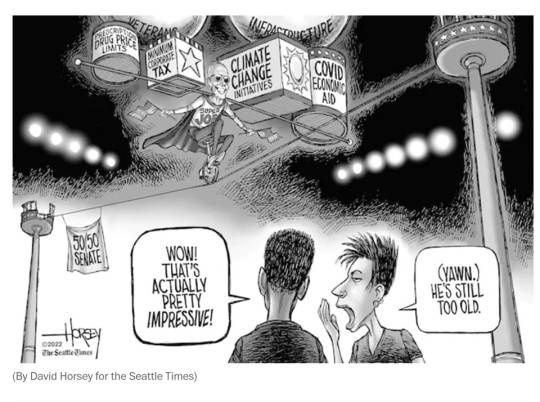
David Horsey
* * * *
LETTERS FROM AN AMERICAN
June 11, 2024
HEATHER COX RICHARDSON
JUN 12, 2024
“We’re producing more energy than ever before in this nation. We have the strongest economy in the world, and we are beating China for the first time in decades. More people went to work this morning in America than at any other time in our nation’s history. So I’ve got a message to Donald Trump and all his negativity and his whining: Stop sh*t talking America. This is the greatest country on earth, and it’s time that we all start acting like it.”
Pennsylvania governor Josh Shapiro’s words to Jen Psaki on MSNBC yesterday illustrated that Democrats are flipping the script on the MAGA Republicans.
Since he decided to run for president in 2015, almost exactly nine years ago, Trump’s narrative has been that the United States is in terrible decline and that only he can “make America great again.” In his speech announcing his candidacy on that June day in 2015, he claimed that “our country is in serious trouble” and complained that China, Japan, and Mexico were all “beating” the U.S. and “laughing at us, at our stupidity…. The U.S. has become a dumping ground for everybody else’s problems,” he said before launching into the idea that Mexico was sending criminals and rapists across the border. “Our enemies are getting stronger and stronger…, and we as a country are getting weaker,” he said. “Even our nuclear arsenal doesn’t work.”
Trump claimed—falsely—that the nation’s gross domestic product was below zero, that the labor participation rate was “the worst since 1978,” that unemployment was between 18 and 20 percent, and that while Obamacare was “amazingly destructive,” he would replace it with something cheaper and better.
Trump continued this theme of decline and what he called “American carnage” in his inaugural address. He described “[m]others and children trapped in poverty in our inner cities; rusted-out factories scattered like tombstones across the landscape of our Nation; an education system, flush with cash, but which leaves our young and beautiful students deprived of all knowledge; and the crime and the gangs and the drugs that have stolen too many lives and robbed our country of so much unrealized potential.”
Trump initially seemed to blame inept politicians and bureaucrats for what he claimed was America’s decline, assuring the audience at his 2015 campaign announcement: “Well, you need somebody, because politicians are all talk, no action. Nothing’s gonna get done. They will not bring us—believe me—to the promised land. They will not.” But when then–FBI director James Comey refused to drop the investigation into the relationship between Russian operatives and the 2016 Trump campaign, Trump and his loyalists began to warn of a secretive “deep state” that was working to undermine Trump and, with him, the nation.
Trump’s narrative that he is the true defender of the United States, under attack by dark forces, maps beautifully over white evangelical narratives of religious decline. Trump continued that storyline even after voters turned him out of the White House, insisting that a nefarious conspiracy of Democrats, undocumented immigrants, and foreigners stole the election from him.
The House Select Committee to Investigate the January 6th Attack on the U.S. Capitol estimated that Trump raised $250 million in donations from supporters for an “election defense fund” to pay the legal fees to overturn the results of the 2020 election. But the Trump team never actually set up that fund. Instead, the money went to the Save America political action committee founded and controlled by Trump, and from there the money went to Trump loyalists and pro-Trump organizations.
And therein lies a key reason for Trump’s story of an apocalyptic America: describing the nation as a hellhole that only he can fix also maps over a common pattern of American grifters. So long as supporters send him money, he claims, they will be able to defend the country against dark forces: communists, Marxists, atheists, immigrants, pedophiles, feminists—just what the dark forces are matters far less than that they are a foil for the grifter.
When Trump made that argument in 2015, it was not all that far-fetched. Economists estimate that the supply-side economics of the past 40 years had shifted $50 trillion dollars from the bottom 90% of Americans to the top 1%, hollowing out the middle class. Schools had been chronically underfunded, and the opioid epidemic, which began in 1999, was claiming more than 10,000 Americans a year (a number that has continued to rise ever since). And by weaponizing the filibuster and gerrymandering states, Republicans had made it extraordinarily difficult for Congress to accomplish anything that would address these issues.
When Biden took office, he was in the unusual position of signing executive orders to establish policies that were not unpopular, like Trump‘s, but that were extraordinarily popular. This began the process of showing that the government could, in fact, represent the people.
Then, thanks to the election of Georgia senators Raphael Warnock and Jon Ossoff in a runoff election on January 6, 2021—that was the seismic shift of January 6, 2021, that is often forgotten—the Democrats continued to demonstrate that the government could work for the people. They passed the American Rescue Plan to shore up the U.S. economy after the pandemic shutdowns, the Bipartisan Infrastructure Act to rebuild roads and bridges and improve broadband access, the CHIPS and Science Act to promote semiconductor manufacturing, the Inflation Reduction Act to invest in climate change mitigation and permit the government to negotiate with pharmaceutical companies over drug prices, and the Bipartisan Safer Communities Act to close loopholes in gun purchases.
Those changes have created a roaring economy with an unemployment rate that has just last month ticked up to 4% after 27 months below that number, with wages growing faster than the inflation that plagued the U.S.—and the world—after the pandemic eased. The highest wage growth has gone to the lowest earners, helping to cut the nation’s extreme wealth inequality.
That booming economy might be partly what’s behind another significant change: for all that Trump and MAGA Republicans still talk about Democratic cities as hellholes, the FBI yesterday released a report showing that violent crime in fact dropped by more than 15% in the U.S. during the first three months of 2024. As Jim Sciutto of CNN pointed out today, “Murders fell 26.4% and rapes decreased by 25.7%. Aggravated assaults decreased by 12.5%, according to the data, robberies fell 17.8%.” In his own assessment, Biden attributed those dropping numbers to “putting more cops on the beat, holding violent criminals accountable, and getting illegal guns off the street.”
On June 1, top sports talk host Colin Cowherd anticipated Shapiro’s pro-American stance when he pushed back on the Republican idea that the country is a dystopian nightmare. “[Trump’s] trying to sell me an America that doesn’t exist,” he said. “Stop trying to sell me on ‘everything’s rigged, the country’s falling into the sea, the economy’s terrible,’” he continued. “The America that I live in is imperfect. But compared to the rest of the world, I think we’re doing okay.”
Today, Biden pointedly illustrated one more difference between Trump and the real world. In the wake of his own conviction on 34 criminal counts, Trump has amped up his insistence that the Department of Justice is rigged against him and must be purged of nonpartisan civil servants and repopulated with his own loyalists. Biden today underscored his own respect for the rule of law.
This afternoon a jury found Biden’s 54-year-old son Hunter Biden guilty on three charges of lying on a form required to purchase a gun in 2018 when he checked the “no” box that asked if he was “an unlawful user of, or addicted to,” drugs. That lie permitted him to buy the gun that he owned for 11 days. His lawyer argued that he did not consider himself an addict because he was trying at the time to end his drug dependence.
The news made the Trump team rush back to their narrative. “This trial has been nothing more than a distraction from the real crimes of the Biden Crime Family, which has raked in tens of millions of dollars from China, Russia and Ukraine,” Trump campaign spokesperson Karoline Leavitt said. Echoing the false allegations MAGA Republicans have made about President Biden, she added: “Crooked Joe Biden’s reign over the Biden Family Criminal Empire is all coming to an end on November 5th, and never again will a Biden sell government access for personal profit.”
But there is no Biden family business, and Hunter Biden is not in the administration. President Biden has kept his distance from the case. Today he said, “I am the president, but I am also a dad. Jill and I love our son, and we are so proud of the man he is today. So many families who have had loved ones battle addiction understand the feeling of pride seeing someone you love come out the other side and be so strong and resilient in recovery. As I…said last week, I will accept the outcome of this case and will continue to respect the judicial process as Hunter considers an appeal. Jill and I will always be there for Hunter and the rest of our family with our love and support. Nothing will ever change that.”
—
LETTERS FROM AN AMERICAN
HEATHER COX RICHARDSON
#David Horsey#Letters From An American#Heather Cox Richardson#Biden administration accomplishments#MAGA Narrative#TFG#famous American grifters#The MAGA narrative#Infrastructure Act#CHIPS and science act
10 notes
·
View notes
Text
While many government leaders continue to declare their commitment to respect the rule of law as the foundation for peace and human rights, in practice their performance is perforated with lackluster results or outright failure. As a result, people are losing faith in democratic politics and turning to authoritarian alternatives, or simply tuning out. Now more than ever, strong guardrails such as independent judiciaries, robust civil society, and trustworthy elections are needed to stop the slide and build fairer and more accountable systems.
The rule of law recession continues
Unfortunately, study after study confirms that countries are still very far from their own stated allegiance to democracy, rights, and the rule of law. The latest such report, the World Justice Project’s annual Rule of Law Index, shows a continued downturn in respect for the rule of law at the national level. The index, which this year relied on original data collected from 3,400 in-country experts and practitioners and more than 149,000 households, now covers 142 countries representing 95% of the world’s population.
Scores for the rule of law this year fell in 59% of countries surveyed, the sixth consecutive year in which the majority of countries declined. Since 2016, the rule of law has fallen in 78% of countries studied.
Trends and drivers
The main drivers of this worrisome pattern are a growing disrespect for human rights, weakening checks on government power, and malfunctioning justice systems. For example, authoritarian trends marked by centralization of executive power — at the expense of legislatures, judiciaries, civil society, and the media — worsened in 56% of countries this year, somewhat less than in the previous two years but still widespread.
Since 2016, civic participation has dropped in 83% of countries, more than any other indicator, followed by freedom of assembly and association (81%), freedom of opinion and expression (78%), and freedom of religion (76%); these are all core rights enshrined not only in the Universal Declaration of Human Rights but also in treaty law and most constitutions. The ability of civil and criminal justice systems to resolve disputes declined in more states this year (66%), due to greater justice delays and weaker enforcement of judgments.
Within these general trends lies a more troubling story: Countries with weaker rule of law have experienced larger declines in their scores than countries with stronger rule of law. Moreover, “improvers” of any type have improved only modestly, while “decliners” have declined more dramatically (see accompanying chart below).

Source: WJP Rule of Law Index 2023
And countries that have declined for five consecutive years (16 of 113, led by Nicaragua, Iran, Myanmar, and Belarus, among the index’s worst performers) far outnumber those that have improved every year for the same period (two: Uzbekistan and Kazakhstan). These trends suggest that rule of law malfunctions can become ingrained, exacerbating efforts to reverse course without long-term political will and resources.
Failure to deliver
As governments fail to deliver basic public services like access to justice, or worse, abuse their citizens’ rights, positive views of democratic institutions and politics drop further. Bad governance and corruption become entrenched, compounding crises and stoking further conflict and displacement within and across borders.
For example, countries high on the international security agenda for years — Afghanistan, Sudan, and Myanmar — are also some of the worst rule of law performers. In this hemisphere, Haiti (ranked 139 of 142) is collapsing before our eyes as governments struggle for months to devise an adequate response, while Venezuela (ranked last) continues to generate a record number of displaced people fleeing persecution and gross economic mismanagement.
Russia offers another telling example of the correlation between authoritarian governance and conflict. Ranking 113 out of 142 countries, and near the bottom in its regional and income group, Russia scored particularly low on such indicators as fundamental rights, criminal justice, and constraints on government power.
Meanwhile, democratizing Ukraine, whose rule of law score had been improving before Russia invaded it, performed significantly better than Russia on those same three indicators.
This year’s disappointing report card on progress toward achieving the U.N. Sustainable Development Goals, which includes Goal 16’s promise to “provide access to justice for all and build effective, accountable and inclusive institutions,” provides further evidence of how far national governments still have to go to deliver adequate public goods to their citizens.
Back to basics
It doesn’t have to be this way. Evidence shows that strong liberal democracies with robust rule-of-law regimes provide better domestic and international peace and security. They generally do not go to war against each other and manage internal dissent through nonviolent channels and respect for human rights. Hybrid authoritarian and weak states, on the other hand, are more likely to experience intra- and interstate conflict, generate refugees, hinder women’s equality, and harbor violent extremists.
President Joe Biden’s timely agenda to support democracy at home and abroad, and a renewed programmatic focus by the Department of Justice and the U.S. Agency for International Development on people-centered justice, are encouraging but faces daunting headwinds in the wake of domestic and geopolitical conflicts of a new magnitude. Multiple criminal indictments and ongoing election denialism by a former president and leading contender to return to the White House will continue to test the United States’ ability to reverse its declining rule of law performance and lead by example.
From such storms must come a renewed social and political contract for peace and human dignity. It should begin with a return to the promise of the Universal Declaration of Human Rights, whose first article declares that “all human beings are born free and equal in dignity and rights.” If states were to uphold this dictum in practice, they would give their citizens a fair voice in how they are governed. They would ensure equal protection of the law, regardless of status or power. And they would create governing systems based on the rule of law, the best guarantor of human rights.
30 notes
·
View notes
Note
How many non-BLs do you watch in general, and why is it good to mix up your media intake?
Look at you forcing me to admit I watch more than you on main. As you know, the answer is: a lot. You don’t become a drama scholar by slacking!
My MDL right now says I’ve completed about 350 dramas, and that’s across a wide variety of Asian media. I watch stuff from Korea, Japan, Thailand, and China very regularly, as well as whatever I can find from Taiwan, Philippines, and Vietnam (some of this isn’t even tracked on MDL so my total watch number is always higher than whatever it says). I also watch Western media but not nearly as much. By my count I’ve watched about 85 dramas this year, and the bl to not-bl split is about 50/50.
I try to watch at least a few bls live week to week at any given time for fandom participation reasons, because it’s fun to take part in the discourse. And I’m always also working through a long backlog of non-bl dramas, which I binge one at a time (unlike some people who try to simultaneously watch 20 things one episode at a time, ahem). And I do think the variety is important for a number of reasons.
I am truly a lover of stories, and I always want another one. I usually also have a book going on top of my drama viewing.
I’m analytical by nature and very interested in narrative structure, characterization, plotting and pacing, and all the other components of good storytelling. You learn these things best by studying and observing what works and what doesn’t in the media you consume.
Watching dramas from different countries gives you the chance to learn about a variety of cultures and draw connections between cultural norms and values, how stories get told, and how each industry interacts with audiences both domestic and international.
Having a well-balanced media diet also affords you the opportunity to learn about differences between cultures and how these countries’ media speaks to and influences each other.
Fiction is a great way to process your emotions and get to know yourself. Varying the genre, style, and tone on your watch list opens your mind to so much creativity and allows you to find affinity and connection with things you didn’t even know you liked. If you’re not willing to venture out of your usual patterns and safe zones, you may never know yourself entirely.
Consuming too much of any one thing is bad for your brain. If you only watch one kind of story over and over again, you will lack perspective and capacity for critical analysis, because you lose touch with the wider context of the media landscape. Comparative analysis keeps you sharp and helps you learn.
To put it simply: There’s a great wide world of stories out there, and I want to see and learn from them all.
30 notes
·
View notes
Text




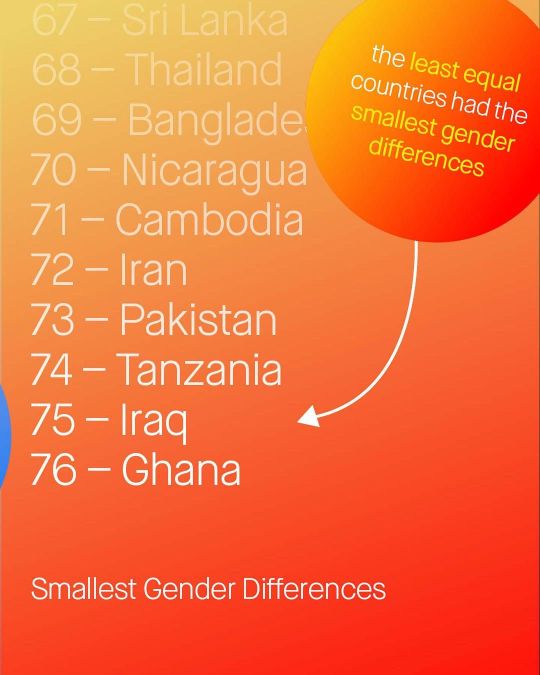
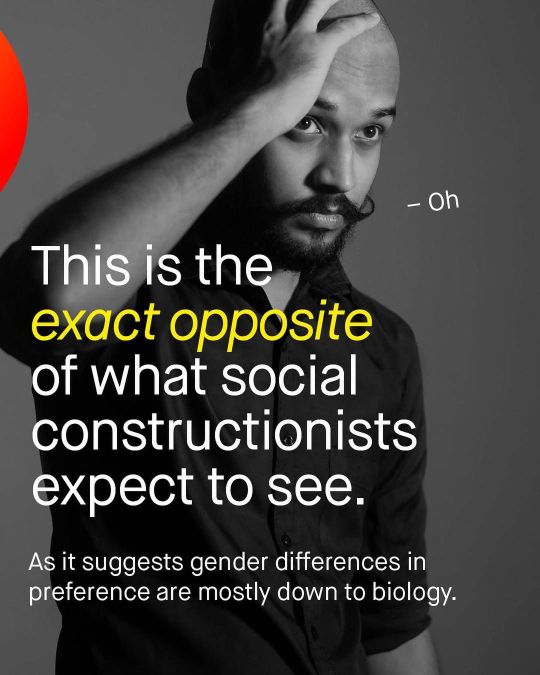




A major discussion at the very centre of the gender debate, asks: why are men and women different?
Are they different because we tell them to be different? Through toys in childhood, TV in adolescence, and a continual bombardment of gender norms from society, our media, our family, our friends, from everyone.
Is our gender shaped through society, through ‘social constructivsm’?
Alternatively -
Are our gender preferences innate?
Are we born masculine or feminine; born with our gendered thinking, like we are born with our sexuality?
Are the preferences, behaviours and temperaments of men and women, part of our biology? And if so, are they immutable?
So many questions.
Well, a new study from 2018 has reopened the debate.
Showing that the more equal and wealthy a society, the more men and women grow apart in their behaviour.
That’s right.
The wealthier and more equal the country, the *more* its men engage in risk taking behaviour, and the more altruistic its women become, for example.
It’s an annoying spanner in the works for the social constructivists, and feminists, who insist we are all the same blank slates – and are simply brainwashed, or coloured in, by society.
But are we?
-
Sources:
Scientific American:
https://www.scientificamerican.com/article/when-times-are-good-the-gender-gap-grows/
Study:
https://www.science.org/doi/10.1126/science.aas9899
Study:
Abstract
Preferences concerning time, risk, and social interactions systematically shape human behavior and contribute to differential economic and social outcomes between women and men. We present a global investigation of gender differences in six fundamental preferences. Our data consist of measures of willingness to take risks, patience, altruism, positive and negative reciprocity, and trust for 80,000 individuals in 76 representative country samples. Gender differences in preferences were positively related to economic development and gender equality. This finding suggests that greater availability of and gender-equal access to material and social resources favor the manifestation of gender-differentiated preferences across countries.
--
More studies:
Abstract
Men's and women's personalities appear to differ in several respects. Social role theories of development assume gender differences result primarily from perceived gender roles, gender socialization and sociostructural power differentials. As a consequence, social role theorists expect gender differences in personality to be smaller in cultures with more gender egalitarianism. Several large cross-cultural studies have generated sufficient data for evaluating these global personality predictions. Empirically, evidence suggests gender differences in most aspects of personality-Big Five traits, Dark Triad traits, self-esteem, subjective well-being, depression and values-are conspicuously larger in cultures with more egalitarian gender roles, gender socialization and sociopolitical gender equity. Similar patterns are evident when examining objectively measured attributes such as tested cognitive abilities and physical traits such as height and blood pressure. Social role theory appears inadequate for explaining some of the observed cultural variations in men's and women's personalities. Evolutionary theories regarding ecologically-evoked gender differences are described that may prove more useful in explaining global variation in human personality.
Abstract
Using data from over 200,000 participants from 53 nations, I examined the cross-cultural consistency of sex differences for four traits: extraversion, agreeableness, neuroticism, and male-versus-female-typical occupational preferences. Across nations, men and women differed significantly on all four traits (mean ds = -.15, -.56, -.41, and 1.40, respectively, with negative values indicating women scoring higher). The strongest evidence for sex differences in SDs was for extraversion (women more variable) and for agreeableness (men more variable). United Nations indices of gender equality and economic development were associated with larger sex differences in agreeableness, but not with sex differences in other traits. Gender equality and economic development were negatively associated with mean national levels of neuroticism, suggesting that economic stress was associated with higher neuroticism. Regression analyses explored the power of sex, gender equality, and their interaction to predict men's and women's 106 national trait means for each of the four traits. Only sex predicted means for all four traits, and sex predicted trait means much more strongly than did gender equality or the interaction between sex and gender equality. These results suggest that biological factors may contribute to sex differences in personality and that culture plays a negligible to small role in moderating sex differences in personality.
Abstract
Previous research suggested that sex differences in personality traits are larger in prosperous, healthy, and egalitarian cultures in which women have more opportunities equal with those of men. In this article, the authors report cross-cultural findings in which this unintuitive result was replicated across samples from 55 nations (N = 17,637). On responses to the Big Five Inventory, women reported higher levels of neuroticism, extraversion, agreeableness, and conscientiousness than did men across most nations. These findings converge with previous studies in which different Big Five measures and more limited samples of nations were used. Overall, higher levels of human development--including long and healthy life, equal access to knowledge and education, and economic wealth--were the main nation-level predictors of larger sex differences in personality. Changes in men's personality traits appeared to be the primary cause of sex difference variation across cultures. It is proposed that heightened levels of sexual dimorphism result from personality traits of men and women being less constrained and more able to naturally diverge in developed nations. In less fortunate social and economic conditions, innate personality differences between men and women may be attenuated.
Abstract
We investigated sex differences in 473,260 adolescents’ aspirations to work in things-oriented (e.g., mechanic), people-oriented (e.g., nurse), and STEM (e.g., mathematician) careers across 80 countries and economic regions using the 2018 Programme for International Student Assessment (PISA). We analyzed student career aspirations in combination with student achievement in mathematics, reading, and science, as well as parental occupations and family wealth. In each country and region, more boys than girls aspired to a things-oriented or STEM occupation and more girls than boys to a people-oriented occupation. These sex differences were larger in countries with a higher level of women’s empowerment. We explain this counter-intuitive finding through the indirect effect of wealth. Women’s empowerment is associated with relatively high levels of national wealth and this wealth allows more students to aspire to occupations they are intrinsically interested in. Implications for better understanding the sources of sex differences in career aspirations and associated policy are discussed.
==
There's no "patriarchy." Men and women are just different.
Hell, here's four studies of primates that show comparable sex-linked tendencies, preferences, habits and instincts as humans:
Sex differences in rhesus monkey toy preferences parallel those of children: https://pubmed.ncbi.nlm.nih.gov/18452921/
Toy story: Why do monkey and human males prefer trucks?: https://www.ncbi.nlm.nih.gov/pmc/articles/PMC2755553/
Young female chimpanzees treat sticks as dolls: Growing evidence of biological basis for gender-specific play in humans: https://www.sciencedaily.com/releases/2010/12/101220121109.htm
Sex differences in response to children's toys in nonhuman primates: https://www.sciencedirect.com/science/article/abs/pii/S1090513802001071?via%3Dihub
Social constructivism is complete horseshit. Not only is "Patriarchy Theory" an explicit denial of evolution, but a full-blown conspiracy theory.
https://www.realityslaststand.com/p/the-new-evolution-deniers-in-retrospect
Given that humans are sexually dimorphic and exhibit many of the typical sex-linked behavioral traits that any objective observer would predict, based on the mammalian trends, the claim that our behavioral differences have arisen purely via socialization is dubious at best. For that to be true, we would have to posit that the selective forces for these traits inexplicably and uniquely vanished in just our lineage, leading to the elimination of these traits without any vestiges of their past, only to have these traits fully recapitulated in the present due to socialization. Of course, the more evidenced and straightforward explanation is that we exhibit these classic sex-linked behavioral traits because we inherited them from our closest primate ancestors.
#The Tin Men#sex based differences#sex differences#sex linked behaviors#patriarchy#myth of the patriarchy#the patriarchy#patriarchy myth#social constructivism#social construct#evolution denial#socialization#patriarchy theory#conspiracy theory#religion is a mental illness
8 notes
·
View notes
Text
“The Great Depression reached into every corner of the country, but it did not affect all people equally. For many middle-class women of all races, the depression required certain changes in spending patterns: buying cheaper cuts of meat, feeding the homeless men who stopped at the back door, and doing without new clothes. Some of these women continued to do community volunteer work, raising money for the unemployed. They saw the food lines, but they did not have to join them.
Among women workers, race played an important role. The fierce competition for jobs fueled racial resentments. Mexican-American and African-American women were the first to lose their jobs and the last to get relief from welfare agencies. Often, they were already living on the margin of survival. Before 1933, when the Prohibition amendment making the manufacture or sale of alcoholic beverages illegal was repealed, many of these women turned to bootlegging, making their own beer or liquor and selling it.
…Even relatively prosperous farm women--owners, not tenants--in general produced as much as 70 percent of what their families consumed in clothing, toys, and food. They not only gardened but raised poultry. During the depression, women increased the size of their gardens and the number of their hens. They made more butter from their dairy cows and sold it. They cut up the sacks that held large amounts of flour and sewed them into underwear. In the previous decade, they had proudly begun to participate in a culture of store-bought goods. Now they began to can food again. Government agents dragged huge canning kettles across the mountains of northern New Mexico and eastern Tennessee so that women in remote farming villages could preserve their food.
Even with all this work, rural children suffered from malnutrition, and rural women faced childbirth without a doctor or midwife because they could afford neither the medical fees nor the gasoline for transportation. The women resented their declining standards of living, particularly those from better-off farm families who owned their own farms and had, during the 1920s, aspired to participate in the new domestic technology of indoor bath-rooms, modern stoves and heating, and super cleanliness.
…In 1936, a federal appeals court overruled an earlier law that had classified birth control information as obscene and thus illegal to dispense. That decision still left state laws intact, however. The number of birth control clinics nationwide rose from 55 in 1930 to 300 by 1938, but in some states and in many rural areas women still had no access to birth control. In 1937, North Carolina became the first state to provide contraceptives with tax dollar, and six others soon followed. Ironically, North Carolina’s reasoning was not that birth control was a human right but that birth control would reduce the black population.
Despite statistics showing that black women had fewer babies than white women with similar incomes and living situations, many white southern officials in states with large black populations feared a black population explosion. In 1939, the Birth Control Federation of American responded to eager southern state governments by developing “The Negro Project,” a program to disseminate birth control information, which they carefully staffed with local black community leaders. Whatever the logic, one quarter of all women in the United States in their 20s during the depression never bore children. This was the highest rate of childlessness for any decade. Many people simply decided not to get married, and marriage rates fell.
…In the mass media women seemed to be receiving mixed messages. On the one hand, in 1930, the Ladies’ Home Journal featured a former career woman confessing, “I know now without any hesitation… that [my husband’s job] must come first.” In 1931, the popular magazine Outlook and Independent quoted the dean of Barnard College, a women’s college in New York City, telling her students that “perhaps the greatest service that you can render to the community… is to have the courage to refuse to work for gain.” And on its front page in 1935, the New York Times reported that women “suffering from masculine psychological states” and an “aversion to marriage” were being “cured” by the removal of their adrenal gland. In this atmosphere, not only were women workers under fire, but women who centered their lives on women rather than on men came under attack. Lesbianism was no longer chic. Lesbian bars almost disappeared. Homosexuality was now seen by many people as just one more threat to the family.
On the other hand, movie houses showed zany screwball comedies with more complicated lessons. Often deliciously ditsy, incompetent women were rescued by sensible, capable men. Yet, the men in these movies were frequently portrayed as bumbling or slower-witted than the women. Sometimes the men were people who needed joy and whimsy restored to their lives, not an unexpected theme for a nation in the throes of an economic depression. In other movies, however, women were by no means incompetent. The women portrayed by Katharine Hepburn, Bette Davis, and Joan Crawford in the 1930s were often intelligent but needed men alternately to tame and to soften them.”
- Sarah Jane Deutsch, “Making Do with Disaster.” in From Ballots to Breadlines: American Women, 1920-1940
#sarah jane deutsch#1930s#race#gender#from ballots to breadlines#class#20th century#history#american
19 notes
·
View notes
Note
Hello. I saw your post on tradwives and I wanted to ask a question. I am an aspiring tradwife and an ex-feminist. And I'm genuinely curious about what you said. I respect your opinions and understand you want the best for women and yourself too.
Do you believe that what you said applies to most tradwives or just white tradwives in first world countries? Additionally, in my personal experience, I did not have a working mother but I was pushed into university even when I knew I couldn't handle it. Isn't it better for women who cannot handle the competitive job world to become a tradwife? Particularly if they're naturally submissive, like housework and submitting to someone who can make their decisions for them? I have talked to really good traditional men who are good people and their masculinity consists of being strong and protective men instead of the abusive ones feminists think they generally are.
That's not exactly one question so apologies for that. I mean this all in good spirit and I genuinely want to know. Have a good day!
On the contrary, women who feel overwhelmed and scared by the world, who just want a nice protective man to look after them, and who have people pleasing tendencies and feel incapable to handle independence, are the women who are most vulnerable and susceptible to abuse. If your motivation for becoming a tradwife is that are scared of independence then what leverage do you have if the men you rely on to look after you fail you in some way? If you cannot handle independence you will find it so much harder to be able to leave.
What exactly do you think abusive men look like? Do you think they announce themselves to everyone in any given circumstance? You say you've spoken to really good traditional men, how well do you know them really? How well do the women who get abused by their partners know their men? Abusiveness is virtually never obvious and manifests in many ways across a relationship, as does negligence which is how so many women who are supposedly being 'provided for' end up bearing the full brunt of managing a household and finding that if they are ever sick or need anything, their husbands leave them.
I don't believe in 'natural submissiveness', especially in women. I myself am soft-spoken, have trouble asserting myself and often fall into people-pleasing patterns including a lifelong struggle with subconsciously and consciously pleasing and coddling the men around me. Many women are the same, is this a natural fixture of our personalities that we should just fall into and let men decide things for us? Or is it a response to social conditioning and a brutal world designed to undermine women's confidence in ourselves and our ability to participate in society as equals so that we rely on men? I encourage you to look beyond your fears and insecurities to see what you're really capable of.
What I've said about tradwives applies to places where women have more choices and expectations to participate in the external economy/workforce and are told they could potentially succeed in capitalism in their own right. Because it is a different thought process for women who are given no opportunity or expectation to be defined beyond wifehood and motherhood. The very notion of 'tradwife' is western centric, as its all about returning to so called 'traditional' roots.
90 notes
·
View notes
Text
Imagine attending a massive Tournament hosted by the Pokemon League, hosting the Gym Leaders across several countries all tied to the league.
You mind your own business, loving the high-energy atmosphere and Pokemon as far as the eye can see, and seeing this ENTOURAGE, literal ENTOURAGE of twelve people pass you by like you walked out of a Pokemon Tournament into a historical reenactment for a region that is absolutely NOT yours and not one you've been too introduced to, though its familiar in the aesthetics department, but doesn't quite click with a name at first.
You got this leading woman at the cluster's centre, who is almost comically shorter than all the attendants fussing around her like Combees around a Vespiqueen, fussing over her appearance and talking with her. It sounds like Saihōka, but they're going a mile a minute. It's obvious there's no proper conversation, just context on top of context and a repeating 'yeah, yup, got it, you fuss, listen to me, I'm fine.' but it makes sense in the busy environment - but maybe they're saying more.
It's hard to pay attention to the conversation because holy fuck is this woman OVERDRESSED, we're talking full jūnihitoe (at least 6 layers from what you can see) with fabrics patterned with various fall seasonal crops, hair styled, face paper white and powdered with painted features, holding a metal crook taller than herself with an IRON LOOKING PAGODA LANTERN HANGING FROM IT AND WITH A FIRE ACTIVELY INSIDE IT and you're left questioning WHAT?! When she bangs the staff on the ground and releases this NOIVERN, this bigass bat dragon, from its Pokeball and says something in a commanding way, when the people nod and break from around her (and her bat dragon), letting both walk off to check in before battle.
The lady walks off but like, she's going to stay in your head for a while, and you're going to have to head back and get one of those promotional pamphlets or look into the fan clubs, because now you HAVE to know. What's her deal? What was their deal?
To that end, I'm not surprised Amity and Natsuo got the sort of audience interest they did after they began making big appearances per the Pokemon League contract. Amity IS overdressed, and honestly, she doesn't even dress up to that degree for AT HOME gym battles, only special special ceremonies as a part of the league. But it's about sending an image, being memorable, and making people go 'Different! What? Why?' and what's better for that than dressing up as the common folk-character that is the EMBODIMENT of the fall to make them start asking those questions & get them hooked. And you know Amity doesn't wear the full get-up all tournament, absolutely not, it comes off after the first two days of her active participation, but it served its job VALIANTLY!
2 notes
·
View notes
Text
Mask Bans Insult Disabled People, Endanger Our Health, and Threaten Our Ability to Protest
As a high-risk disabled person who depends on others to keep me safe, I have written about the importance of masking, and I advocate for mask mandates in health care settings. But those individual efforts seem futile against the onslaught of proposed mask bans that would contribute to the spread of COVID and other illnesses, while also pushing high-risk people out of public spaces and protests, violating their right to assemble under the First Amendment.
[...]
Today, the mask is the unsightly marker of deviant individuals: the sick, the immunocompromised, the disabled, and the protester who wishes to keep their identity anonymous. (Many demonstrators at pro-Palestine marches have worn medical masks or other face coverings, both to protect their identity from authorities and to protect their health in large crowds.) We’re told such masked individuals threaten the moral order of society, and these bans are meant to keep the public “safe.”
[...]
Across the country, protests on college campuses have shaken leaders who are unsure how to handle such a groundswell of activism. Leaders in some states took the opportunity to go after student mask use, as in Ohio, where the Republican attorney general threatened on-campus protesters with an obscure anti-mask law. Now, with Democratic officials in California and New York also exploring mask bans, we're reminded that ableism is a bipartisan project.
Any mask ban is a dangerous prospect, as many regions are currently dealing with an increase in COVID cases, and these patterns are expected to continue multiple times a year. (Days after Los Angeles’s Democratic mayor Karen Bass said the city would look into a potential mask ban at protests, she contracted COVID.) A mask ban on the subway would endanger a public good that many people depend on — and have a right to — and the ability of high-risk people to participate in society, to be seen, and matter to the broader community.
Mask bans are a labor issue, as well. A resident of New York City, who asked to remain anonymous to protect their privacy, says, “I wear a mask and encourage others to do so because, prior to COVID, masks were a common form of PPE for indoor and outdoor airborne hazards at work.… The criminalization of masks is a criminalization of workers protecting ourselves…." The resident continues, "Governor Hochul and Mayor Adams supporting attempts to ban masks are the latest examples of New York State Democrats trying to destroy the lives of poor and working-class New Yorkers.”
[...]
What is clear to me is that disabled people have never felt safe. Many of us view masking as a form of solidarity with workers, activists, and people of color all over the world fighting fascism and genocide. But mask bans send the message that it is a crime to be disabled. I think of people who have fought hard to stay relatively safe since early 2020, those who hang on a precipice that feels like it could fall at any moment. Some days I wonder what my breaking point will be.
2 notes
·
View notes
Text
'Blink and you’ll miss it.
In a scene in the new Oppenheimer film set right after the successful 1949 atomic bomb test by the USSR, there is a brief exchange between the film’s two main antagonists. Lewis Strauss, chair of the Atomic Energy Commission, asks J. Robert Oppenheimer what he thinks should be done now. “International control,” Oppenheimer immediately replies.
“You mean world government?” Strauss fires back.
It sounds like a throwaway line, or one of those accusations routinely hurled at those trying to make global institutions marginally more effective. But in this case, Chairman Strauss’ epithet was spot on.
The tremendous destruction of World War II, even before Hiroshima and Nagasaki, prompted a radical rethinking of the world political order. In particular, the idea of world government as the solution to the problem of war was placed front and center in this country’s foreign policy debate, and argued about passionately in diners, dorm rooms, and dinner parties all across the land. Unfortunately, however, the legions of moviegoers who buy tickets to Christopher Nolan’s otherwise excellent film this summer will have no idea that one of the leading proponents of that singular idea was J. Robert Oppenheimer.
After the bomb was dropped on Hiroshima, Oppenheimer threw himself into working to control nuclear weapons. Like other atomic scientists, he was fully aware that the Soviet Union would likely develop its own atom bombs in just a few years, and that time was short to prevent an unrestrained nuclear arms race. The movie refers to his activities as working for “international cooperation.” But his actual ideas were much deeper and more radical than those anodyne words imply.
In 1946, Oppenheimer participated in the development of a report for the secretary of state’s Committee on Atomic Energy about what might be done to control nuclear weapons. The report, which became known as the Acheson-Lilienthal Report but which was authored chiefly by Oppenheimer himself, proposed an international Atomic Development Agency that would have the sole right to mine and process uranium and to run reactors of any kind. This was a radical proposal, but, as its authors explained, they could see no alternative.
In June 1946, Oppenheimer published an article in The New York Times Magazine explaining the proposal to the public. The article discussed the relationship between peaceful and military uses of atomic energy, evaluated a couple of other ideas for controlling atomic weapons, and then discussed the proposed Atomic Development Agency.
It is here, in a section entitled “Sovereignty,” that we come across a striking passage:
“Many have said that without world government there could be no permanent peace, and without peace there would be atomic warfare. I think one must agree with this. Many have said that there could be no outlawry of weapons and no prevention of war unless international law could apply to the citizens of nations, as federal law does to citizens of states, or we have made manifest the fact that international control is not compatible with absolute national sovereignty. I think one must agree with this.”
Similarly, in a January 1948 article for Foreign Affairs magazine, Oppenheimer wrote:
“It is quite clear that in this field we would like to see patterns established which, if they were more generally extended, would constitute some of the most vital elements of a new international law: patterns not unrelated to the ideals which more generally and eloquently are expressed by the advocates of world government.”
From the vantage point of 2023, the remarkable thing about these passages is the apparent assumption that the reader is familiar with the idea of world government, and arguments for and against it, to the point where they can just be mentioned without explanation or elaboration. And for much of the public for much of the 1940s, this was probably true—as remarkable as it might seem to us today, when this notion is entirely absent from the international affairs debate.
Even before the end of the war, world government advocacy had become a prominent feature of the political conversation in America. In 1943, the businessman and Republican presidential candidate Wendell Willkie published a book called One World. The book sold 1.5 million copies in the four months following its release and played a key role in a blossoming of world federation advocacy—long before virtually anyone had heard of anything like an atomic bomb. To choose but one example, an organization known as the Student Federalists, founded in 1942 by a charismatic 16-year-old boy named Harris Wofford, over the next several years formed 367 chapters on high school and college campuses around the country. (Wofford went on to become a United States senator and a key civil rights aide in the White House of President John F. Kennedy.)
Then in 1945, just a few months before the Trinity test, came Emery Reves’ The Anatomy of Peace. While Willkie’s book was a travelogue describing his voyage around the world, Reves’ was an extended logical argument that only law could create peace and only a world federation—a union of nations with a government taking care of issues that could not be handled at the national level—could create meaningful law that applied to individuals rather than governments. Indeed, Oppenheimer’s passage above could have easily been a summary of Reves’ book.
It is worth noting that both of these books were published before the United Nations Charter was more than a draft. (It was eventually signed on June 26, 1945, less than a month before the Trinity test.) The activism they inspired attempted to make the UN something more than an agglomeration of sovereign states that could sign treaties with each other, but in the end were subject to no law worthy of the name. Sovereignty meant that no state could be compelled to do anything it didn’t want to, and treaties could only be enforced by sanctions or war, not through legal action against individuals. (Citizens and various organizations could also take the government to court if it is not properly carrying out its functions, as they can in the U.S.)
It wasn’t just books. Beloved children’s book author and New Yorker editor E. B. White devoted a great many of his editorials to the problem of global anarchy. (These were later collected and published in a book called The Wild Flag: Editorials From The New Yorker on Federal World Government and Other Matters.) Saturday Review editor Norman Cousins, upon reading about Hiroshima, wrote a lengthy editorial for his magazine titled “Modern Man is Obsolete,” that passionately argued for immediate democratic world federation. “There is no need to talk of the difficulties in the way of world government,” wrote Cousins. “There is need only to ask if we can afford to do without it.”
In a similar vein Walter Lippmann, a founder of both The New Republic magazine and the Council on Foreign Relations, and a key player later in the Cuban Missile Crisis, wrote in 1946: “There are few in any country who now believe that war can be regulated or outlawed by the ordinary treaties among sovereign states. … No one can prove what will be the legislative, executive, and judicial organs of the world state … but there are ideas that shake the world, such as the ideal of the union of mankind under universal law.”
Even General Hap Arnold, the only U.S. Air Force officer ever to hold the rank of five stars and founder of the RAND Corporation, said in 1946: “The greatest need facing the world today is for international control of the human forces that make for war.” The atom bomb, he declared, presents “a tremendous argument for a world organization that will eliminate conflict. … We must make an end to all wars for good.”
And before the end of the decade, more than 50,000 Americans had joined the United World Federalists (UWF)—led for three years by a bright young man named Alan Cranston, who went on to serve as a four-term U.S. Senator from California. UWF has continued its operations to this very day and is now known as Citizens for Global Solutions.
A number of physicists also came to support world federation. “Conflicts in interest between great powers can be expected to arise in the future … and there is no world authority in existence that can adjudicate the case and enforce the decision,” said Leo Szilard, who first conceived the nuclear chain reaction. But humanity had at its disposal, he insisted, “the solution of the problem of permanent peace. … The issue that we have to face is not whether we can create a world government … (but) whether we can have such a world government without going through a third world war.”
But the most prominent and most active proponent of world government among scientists was Albert Einstein himself. He had always opposed nationalism, and supporting world federation was a natural extension. Einstein wrote articles, gave interviews, and helped found the Emergency Committee of Atomic Scientists. The Student Federalists of Princeton, New Jersey, held meetings in his living room. And he served as the founding advisory board chair of the United World Federalists.
The type of world government that Einstein promoted would exclusively have power over security issues and a few internal circumstances that could lead to war. But this kind of limited world government was a must. “A new kind of thinking is essential if mankind is to survive and move to higher levels,” he said. “Often in evolutionary processes a species must adapt to new conditions in order to survive. … In light of new knowledge … an eventual world state is not just desirable in the name of brotherhood; it is necessary for survival.”
Oppenheimer’s focus in the postwar years was more near-term. He worked for international control of nuclear matters—both weapons and civilian reactors that could be used to make weapons. But that international control was to take the form of an agency with a strict monopoly on such activities. His 1946 New York Times Magazine piece says about the plan: “It proposes that in the field of atomic energy there be set up a world government. That in this field there be renunciation of national sovereignty. That in this field there be no legal veto power. That in this field there be international law.”
Why would this be significant? In a lengthier article published in 1946 in the Bulletin of the Atomic Scientists, Oppenheimer wrote, “The problem that we are dealing with,” in seeking to prevent atomic war, “is the problem of the elimination of war.” Proposals for addressing nuclear issues were to be judged on whether they also advanced this goal. The article was titled “The Atom Bomb as a Great Force for Peace”—not because of the simplistic and banal argument that the bomb would make war too horrible to contemplate, but because its control would lay the foundation for a world government that truly could abolish war.
Even Edward Teller, accurately portrayed in the Oppenheimer film as pushing for the development of the immensely more destructive hydrogen bombs and eventually undercutting his colleague at the security hearings, appeared to embrace the idea! In 1948, he discussed the Preliminary Draft of a World Constitution, written by a committee of eminent scholars chaired by the chancellor of the University of Chicago, Robert Maynard Hutchins, and aimed at establishing a Federal Republic of the World. And Teller said about this enterprise: “[America’s] present necessary task of opposing Russia should not cause us to forget that in the long run we cannot win by working against something. Instead we must work for something. We must work for World Government.”
And in his 1948 Foreign Affairs article, again Oppenheimer maintained: “If the atomic bomb was to have meaning in the contemporary world, it would have to be in showing that not modern man, not navies, not ground forces, but war itself was obsolete.”
At the end of this essay, Oppenheimer returned to the noble aspirations that so many held in the shattering initial weeks after Trinity, Hiroshima, and Nagasaki. “The aim of those who would work for the establishment of peace,” he insisted, “must be to maintain what was sound in the early hopes, and by all means in their power to look to their eventual realization. It is necessarily denied to us in these days to see at what time, to what immediate ends, in what context, and in what manner of world, we may return again to the great issues touched on by the international control of atomic energy. … (But) this is seed we take with us, traveling to a land we cannot see, to plant in new soil.”
Should we consider all this just a mere historical curiosity? Is anything about these conversations eight long decades ago relevant to the challenges of the 21st Century? As politically unlikely as it might now appear, might something like a genuine world republic provide humanity with the kinds of tools it will require to get a grip on existential perils like the climate emergency, runaway artificial intelligence, and who knows what kinds of new weapons of mass extermination that Oppenheimer’s heirs will almost surely invent in the decades and centuries to come?
The best possible answer to that is the same one purportedly given by China’s Premier Zhou Enlai in 1971, when asked by Henry Kissinger what he thought about the consequences of the French Revolution.
Mr. Zhou, the story goes, considered the question for a moment, and then replied: “I think it is too soon to tell.”'
#Oppenheimer#Lewis Strauss#Zhou Enlai#Atomic Energy Commission#Acheson-Lilienthal Report#Wendell Willkie#One World#Emery Reves#The Anatomy of Peace#Bulletin of the Atomic Scientists#Albert Einstein#Edward Teller#Henry Kissinger
3 notes
·
View notes
Text
TAPACHULA – Around 3,000 migrants set out Sunday on what they call a mass protest procession through southern Mexico to demand the end of detention centers like the one that caught fire last month, killing 40 migrants.
The migrants started from the city of Tapachula, near the Guatemalan border. They say their aim is to reach Mexico City to demand changes in the way migrants are treated.
“It could well have been any of us,” Salvadoran migrant Miriam Argueta said of those killed in the fire. “In fact, a lot of our countrymen died. The only thing we are asking for is justice, and to be treated like anyone else.”
But in the past many participants in such processions have continued on to the U.S. border, which is almost always their goal. The migrants are mainly from Central America, Cuba, Venezuela, Ecuador and Colombia.
Mexican authorities have used paperwork restrictions and highway checkpoints to bottle up tens of thousands of frustrated migrants in Tapachula, making it hard for them to travel to the U.S. border.
Argueta said that when migrants look for work in Tapachula, “they give us jobs, perhaps not humiliating, but the one the Mexicans don't want to do, hard work that pays very little.”
Organizer Irineo Mújica said the migrants are demanding the dissolving of the country’s immigration agency, whose officials have been blamed — and some charged with homicide — in the March 27 fire. Mújica called the immigration detention centers “jails.”
The roots of the migrant caravan phenomenon began years ago when activists organized processions — often with a religious theme - during Holy Week to dramatize the hardships and needs of migrants. In 2018 a minority of those involved wound up traveling all the way to the U.S. border.
This year’s mass walk began well after Holy Week had ended, but Mújica, a leader of the Pueblos Sin Fronteras activist group, called it a “Viacrucis,” or stations of the cross procession, and some migrants carried wooden crosses.
"In this Viacrucis, we are asking the government that justice be done to the killers, for them to stop hiding high-ranking officials," Mújica said in Tapachula before the long walk began. “We are also asking that these jails be ended, and that the National Immigration Institute be dissolved.”
Some migrants carried banners or crosses reading “Government Crime” and “The Government Killed Them.”
The migrants made it only as far as the town of Alvaro Obregon, about 9 miles (14 kilometers) from Tapachula, before stopping to settle down and rest for the remainder of the day, after having walked from around dawn.
The migrants stretched out under a covered athletic court and under trees at a park in Alvaro Obregon. There was no sign at the start of any police attempt to block them.
Mexican prosecutors have said they will press charges against the immigration agency’s top national official, Francisco Garduño, who is scheduled to make a court appearance April 21.
Federal prosecutors have said Garduño was remiss in not preventing the disaster in Ciudad Juarez despite earlier indications of problems at his agency’s detention centers. Prosecutors said government audits had found “a pattern of irresponsibility and repeated omissions” in the immigration institute.
The fire in Ciudad Juarez, across the border from El Paso, Texas, began after a migrant allegedly set fire to foam mattresses to protest a supposed transfer. The fire quickly filled the facility with smoke. No one let the migrants out.
Six officials of the National Immigration Institute, a guard at the center and the Venezuelan migrant accused of starting the blaze are already in custody facing homicide charges.
Migrants, especially poorer ones who cannot afford to pay migrant smugglers, have often seen such mass walks, or caravans, as a way to reach the U.S. border. Successive caravans grew to massive size in 2018 and 2019 before authorities in Mexico and Central American began stopping them of highways.
The COVID-19 pandemic also played a role in quashing the caravans, as countries instituted health restrictions.
The heat and sheer effort of walking 750 miles (1,200 kilometers) to Mexico City usually forces migrants to start walking in the pre-dawn darkness and stop in the early afternoon in towns along the way.
Many of the migrants — some carrying infants or babies in strollers — also look to catch rides from passing trucks. In the past, authorities have sometimes allowed that to happen, and sometimes prohibited it. But sheer desperation drives many of the migrants.
Venezuelan migrant Estefany Peroez was walking with her three daughters. In Tapachula, they had been sleeping in the streets.
“We don't have anything to eat, the authorities don't help us, we are doing this to give my daughters a better life,” Peroez said.
5 notes
·
View notes
Text
LOT22 & Rudi Gernreich
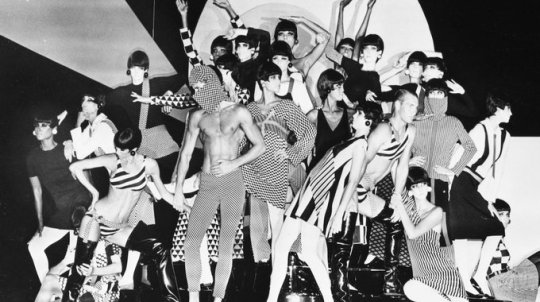
Bringing my twitter thread on the most visible reference for LOT22 fits here...have you heard of Rudi Gernreich?
Described by Marylou Luther as dual-motived, the designer sought to:
"create [unisex] fashion for 20th c. & beyond"
"be a social commentator, who just happened to work in the medium of clothes."


Although both of the pictures attached above are in B&W - color was a focal point of Rudi's work, as he married "proportion, color mixes, and [optical illusion]-like patterns and prints, and all with soft fabrics."




"Gernreich believed that the wearer brought the clothes, or music, to life." Known as modesty's greatest enemy during his time, Rudi's work dealt with the body's natural form (which 🐑 has mentioned), free from frivolous constraints (such as gender) in search of freedom!


Born in 1922 to a Viennese Jewish family, Rudi started sketching from a young age, even being offered a London fashion apprenticeship at 12. His mother declined due to his youth & only 4 years later, they would leave Europe altogether, fleeing the Nazis & landing in LA.

His career began in dance, becoming "highly aware of what clothes did to the rest of the body." His acceptance w/in that space starkly contrasted his turmoil as a refugee & "fueled his commitment designing clothes that proclaimed, ‘You are what you decide you want to be.'"

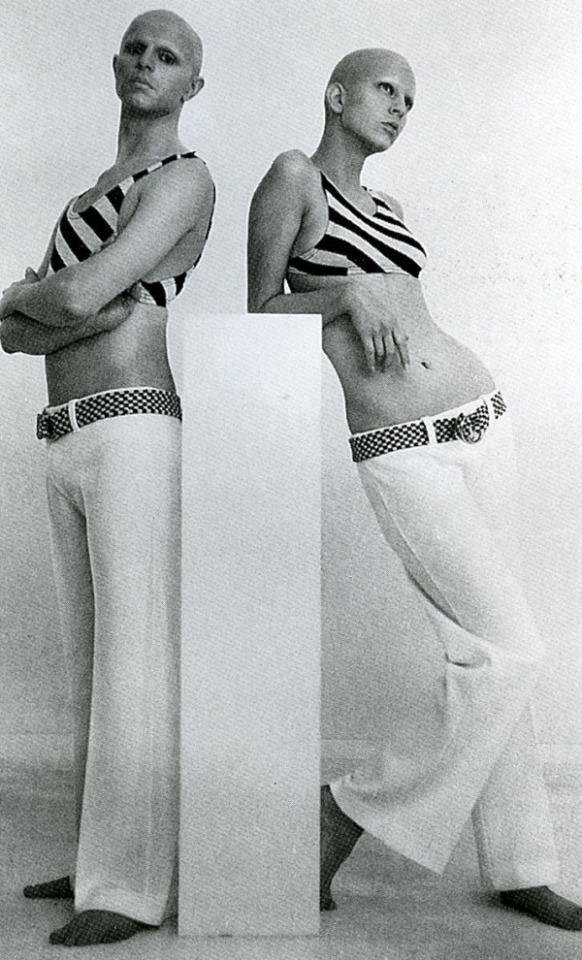



Whilst developing his career as an avant-garde designer, in 1951, Rudi founded The Mattachine Society: an early gay secret society grown out of communist organizers. An invaluable piece of the pre-Stonewall Homophile Movement, Mattachine groups sprung up across the country.


Believing that publicly announcing his sexuality would negatively impact his career, Rudi never 'came out,' although his muse Peggy Moffitt (pictured below wearing the monokini, their most iconic collab) would later say that he "just thought [it] was obvious."



In light of conversations about Harry's fashion in regard to normative gender conceptions, I must respect the consistent homage to one of the greats, who created "democratic, innovative garments that looked ever-forward & expanded the modern woman’s position and participation in the public sphere."


Thanks for reading and learning a little bit more about queer fashion history - made possible by the Harrys!
#hs#harry styles#harry fashion#rudi gernreich#queer fashion history#queer history#harry styles fashion#fashion history
3 notes
·
View notes